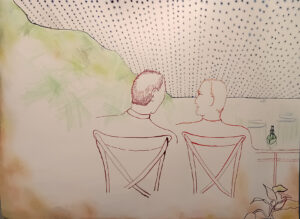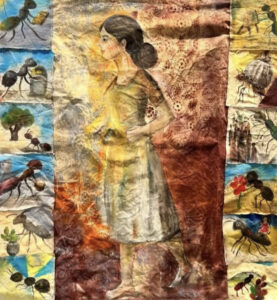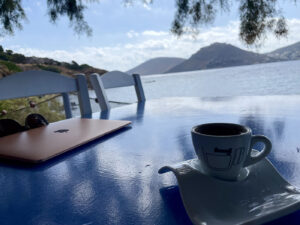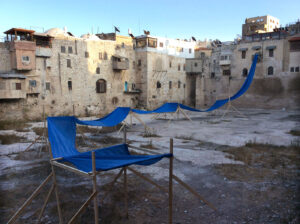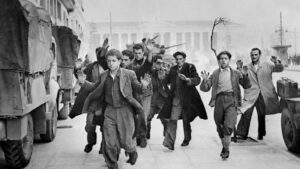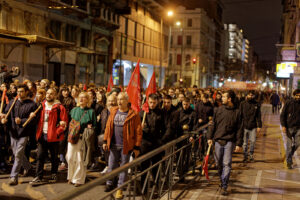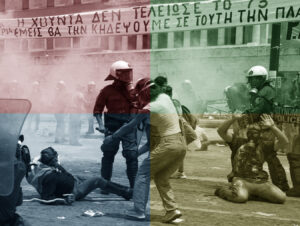Nektaria Anastasiadou
Anestis Nazos had the impression that a mystical fisherman was passing a hook through his spinal cord. Perhaps the back pain was his punishment for years of fishing with live bait. He stood up with a groan and, without drinking even a sip from the coffee just served by a novice, turned his back to his sister the nun. Furious, he left the monastery and walked in the sleepy, whitewashed town with its low wooden galleries, its streets narrower than the corridors inside the surrounding houses, its bougainvilleas growing through the windows in garden walls. The town was silent. A foreigner might think it uninhabited, but in fact the locals had already returned from work. The observant were eating Lenten foods, and the non-observant anything they fancied. Others napped. It was April, somewhere in the middle of Lent, yet Anestis couldn’t be bothered with such things. He hadn’t fasted for Lent since he was a child, and even then, he did so more from lack of food than from religious duty.
In a few months, the Germans and Italians would return with various cinema stars, fashion designers, and famous people who did not interest Anestis in the least. In the evenings, the squares would be filled with their laughter, clinking of wine glasses, and chatter in incomprehensible languages. At the end of August, they’d leave again, and for ten months quiet would prevail in Patmos. That was why Anestis had moved back from Athens as soon as he could. He threw his anchor in the quiet of the island. Nothing could move him now. Neither boredom nor draught nor illness nor catastrophes. Not even the damned scooters that ruined the quiet.
As a child he would ascend to the town of Chora barefoot alongside the family mule. Even now, seventy-some years later, his feet hurt whenever he caught sight of the old cobblestone path. Today he had ridden up the road that the Italians had opened and paved with asphalt. The words of his sister, however, had hurt more than the sharp cobblestones that used to tear his feet. Listen now to what his sister the nun said: “You’ve grown old, Anestis. The boat is dangerous for you. Why don’t you donate it to the monastery?”
Anestis kept walking through the streets built like a labyrinth in order to confuse pirates. Unfortunately, in the twenty-first century, the corsairs were residents of the town. The difference was that they were now black-robed landsmen rather than seamen with red beards. Anestis knocked at the door of Thomas, his nephew, who opened and said, “Uncle? So soon?”
Anestis’s kokoni dog, Zoe, rushed out of his nephew’s courtyard. He would have left Zoe in Scala, but she cried so pitifully that Anestis picked her up, straddled the scooter behind his nephew, and brought the dog with him to Chora. Of course, he had to leave Zoe in Thomas’s courtyard in order to visit his sister because the nuns didn’t allow “dirty” dogs inside, despite the monastery being full of feral cats, which were apparently cleaner than house dogs bathed by their families every day. The workings of the ecclesiastical mind were a mystery to Anestis.
He bent down, kissed the white stripe on Zoe’s head, and pet her triangular ears, which folded downward like flaps. Then he stood up straight and said to his nephew, “Thomas, the next time I think of going to the monastery, I want you to tell me to stay in Scala.”
“What happened, uncle? Come inside.” Thomas was still in the sport jacket and blue jeans that he wore to his job at the bank in the square. The children of the family had posh desk jobs now. They’d forgotten their orchards and vegetable gardens. They wouldn’t even recognize barley or fava if they didn’t find it packaged and labelled in the supermarket. They didn’t know how to distill orange flower water, nor to gather mastic berries. Anestis’s niece—Thomas’s older sister that is—had a gift shop in Scala with pillows, clothes, and various other things that came in boats from Piraeus. Anestis’s son was an executive in a shipping company. His daughter was a school teacher, married for the past twenty years to her work. Both of his children lived in Athens and visited the island for only a week in summer. Anestis lived the whole year for that week.
He stepped into the courtyard because he didn’t want to insult his nephew. As soon as he sat in a straw chair, Zoe jumped into his lap. Sometimes Anestis wondered if the kokoni considered him a father or an armchair.
“I’m going to make you a frappé, uncle,” said Thomas. “Try it for once.” He was a short man of 34 years, but Anestis still saw him as the little boy who grew up without ever hearing the word no.
“I don’t drink cold coffee, Thomas. I’ll stay for just a minute.”
Thomas sat on the stone bench next to the giant rosemary that his wife used generously in her cooking. Anestis hated the taste of rosemary in food just as much as he loved the scent of the bush. For that reason, he always avoided staying to eat. In any case, he wanted to leave quickly so that his great nieces and nephew wouldn’t see him angry. Any minute they’d be home from whatever mischief they’d been up to since school let out. So Anestis got right to the point: “Your aunt the nun told me to donate the boat to the monastery.”
Thomas crossed himself. “God forbid! But why do you go and talk to her about your problems, uncle? You know you’ll hear stuff like that from her.”
“Something escaped me about my back pain. And she knows about the episode with the rope and the knife.”
“Uncle Anestis, don’t you have a friend to go fishing with you?”
Anestis raised his chin to say no: “They’ve all got their own boats. Anyway, on the sea you have to choose your company carefully. If my kids lived here, or if you…”
Avoiding his uncle’s gaze, Thomas picked up a doll from the stone pavement and put it in the wall niche beside him. Anestis had given his grandniece that doll, a modern princess as the box said, for her name day. He was pleased to see that she played with his gift.
“Times have changed,” said Thomas. “I get tired at the bank, afterward errands, kids, their extra help lessons, sports games, taekwondo . . .”
“If we lose our boats,” said Anestis, “we’ll be completely dependent. The tourists took our water. Our fava dried up. The orange trees don’t even put out flowers anymore, let alone fruit.”
“Do you want to return to the fields, uncle? To work like an animal all day for a handful of okra and eggplant?”
Anestis remembered the barbaric years before he’d left for Athens, age thirteen, to become a violet seller at bouzouki night clubs. He felt the hard dirt of Patmos ripping through his fingernails. He felt blisters from the pitchfork. He said, “No.”
“Then why are you complaining?”
“They want to trample us, Thomas, so that we eat only from their fish farms.”
“Capitalism.”
“Capitalism is nothing but a flag that they wave to hide the real filth. Capitalism doesn’t give a damn about the amateur fisherman. Capitalism says, whoever sails fastest, let him win. Today’s enemy is something else.”
“I don’t believe in conspiracies, uncle.”
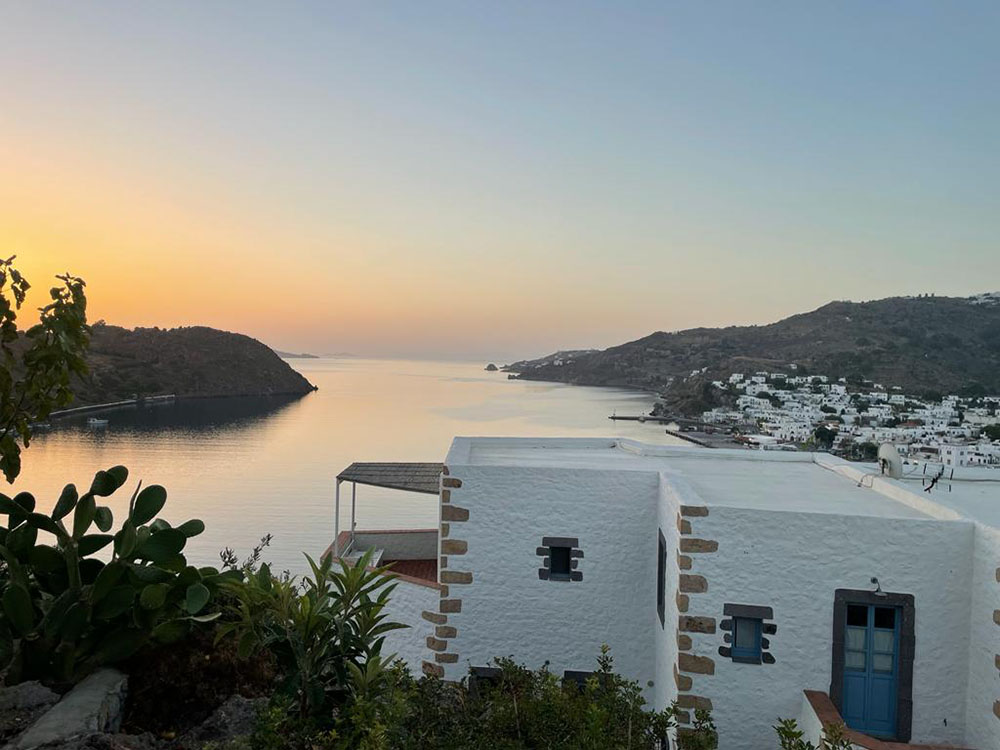
Anestis wanted to awaken Thomas, but he couldn’t speak freely in the courtyard. Somebody was always listening either in the street or in some adjoining garden. Anestis couldn’t say that during the quarantines and lockdowns, he went to Lipsi, an island dried out like a rusk, and caught bonitos that had travelled down from the Black Sea; he couldn’t say that he followed the bright path of the moon to the black waters of Leros, where he caught a 15-kilo grouper by trolling; he couldn’t say that he went to wild Ikaria, where he fished in the phosphorescence that his grandfather called yakamozi; he couldn’t say that he went to Furni island, the old pirate haven, to catch lobsters. He went everywhere freely with his boat, a Greek trehandiri, from the time that freedom was lost all over Greece. He went illegally of course because he didn’t have the money to pay for a test every three days. He never put foot on land, but he found joy in the sea travelling itself, even if it was by night. And since he couldn’t say any of that, Anestis repeated the rallying cry of the Greek Revolution: “Freedom or Death. The kids still learn that slogan at school. Do you understand what it means, Thomas?”
Thomas glanced at his brand-new iPhone. He always bought the latest model as soon it came out, even if the previous one worked perfectly well. He sighed: “What are you going to do with the boat, uncle?”
“I made so many sacrifices to buy it, to fix it up . . . if you grab underneath the railing of another boat, what do you think your fingers will find beneath? Oakum! But I painted even beneath the railing of the trehandiri. Do you know how I did it?”
“Using a mirror.”
“I guess I already told you.”
“The most important question isn’t how you did it, uncle, but why you did it. What’s the point?”
Anestis flipped his keys around his fingers like worry beads, stood, and pulled up his trousers. “Only the places that no one but you can see really belong to you. Time to go.”
“I’ll take you home on the scooter.”
“Not necessary. I know the way.”
Anestis said goodbye and emerged into the alley-like streets of the town, this time accompanied by Zoe. It was a soft spring day. Lavender was in full bloom, and the blue plumbago in clay pots had put out new leaves, readying itself for summer. Zoe rubbed herself against Anestis’s legs and whimpered. She was probably hungry. Perhaps thirsty as well. Anestis bought a bottle of water from the bakery. He filled the collapsible travel bowl that he always kept in his pocket, put it on the stone bench that formed the lower part of a house wall, and sat beside Zoe while she drank. The house itself was empty and had a For Sale sign in the window. Anestis father, also a stonemason, had repaired that bench when Anestis was twelve years old, the same year that Anestis first put on shoes, a women’s pair. His grandfather cut off the heels and handed them to him. They seemed ready to fly, like the sandals of Hermes that he had seen in an old, cast-off Italian book.
Two men and a woman, all well-dressed, perhaps foreigners, approached. None of them greeted Anestis when he smiled at them. One of the men tried to open the house door, but he couldn’t find the right key. Probably a real estate agent who had come to sell the humble little house for a million euro or more. Zoe finished drinking. Anestis looked around for a plant to dump the remaining water. He hated waste. The island had always been dry, but before tourism, they’d managed with their wells, cisterns, and springs. Now the water came in boats. Unfortunately, Anestis didn’t see any flowerpots and was obliged to throw the water onto the stones, murmuring to himself, “Maybe I’ll have to sell it.”
“A house?” asked the real estate agent, who still hadn’t managed to open the door.
“No, sir. A trehandiri boat.”
“I don’t sell those,” said the real estate agent with a nasal Athenian accent.
As if Anestis had asked for his help.
The agent continued: “You’d be best off to give it to the government for demolition. You’ll get good money without hassles.”
Anestis controlled himself. He didn’t want to get into arguments with strangers. A thorny branch behind the real estate agent caught his eye. To change the subject, he said “Too bad I didn’t see that bougainvillea in time. I wouldn’t have wasted the water.”
“Water or pee?” asked the real estate agent.
“If it was pee, I should have thrown it on your head! Come on, Zoe!”
Anestis left Chora as fast as he could, trying not to shuffle in the plastic slippers that he always wore with socks. He realized that his back might act up again on the way down. Lumbar spinal stenosis, the doctor had said a month earlier while he was in hospital following the episode with the knife. In the open sea, a rope fell from the boat and got caught in the propeller. Anestis tried to cut it, but he couldn’t see well in the half light of the moon, and with the trehandiri rocking on the waves, he managed to slice three fingers instead of the rope. On top of that, his back seized up when he flinched from the cut. With his fingers bleeding, he leaned on the boat railing with his elbow, then on the benches until he managed to reach the helm. From there he called the Coast Guard from the wireless. His cell phone had been in his pocket the whole time, but he’d forgotten it. How could he remember? It wasn’t as if he’d grown up with those things. The Coast Guard came. They towed the Orea Eleftheria—Beautiful Freedom—to the harbor. An ambulance took Anestis to the island clinic, where they stitched up his fingers. Thank God, he hadn’t cut bone. Since then, however, he’d been afraid to go out on the sea alone.
If his back acted up on the cobblestone path, at least he could call Thomas. In any case, the clinic was halfway between Chora and Scala, almost directly on the cobblestone path at the height of the Cave of the Apocalypse, which attracted tourists from all over the world but not Anestis. He did, however, enjoy the surrounding nature. The pines, pink rock rose, and thorny burnet beside the path usually relaxed him. This time, however, he was boiling with indignance. Trehandiri boats were wooden elements of culture, a completely Greek sailing craft. During the revolution they were used as postal boats. Unfortunately, nobody understood that the worst years of slavery weren’t during Ottoman times, but now, under the European Union. A friend of Anestis, an amateur fisherman, was stupid enough to surrender his trehandiri for demolition. The moment the bulldozer snapped the boat in its claws, his friend suffered a heart attack and died. The officials who came up with the demolition idea were criminals. The news stations were also guilty. They supported the government by reporting day and night that amateur fishermen, who operated “without control or permission,” were responsible for the destruction of the seas. As if the big fishing companies and farms were innocent bystanders.
Anestis took a deep breath. He had to calm down. Otherwise, he’d also suffer a heart attack. He looked at Scala below, the deep gulf of Patmos, and Lipsi island across the sea. He couldn’t go out fishing again alone. He had to find a younger man worthy of his beautiful Eleftheria. A young man who would treat her properly.
The next day, he wrote the ad:
For sale, OREA ELEFTHERIA, a traditional wooden craft. Carvel planking, frame, and deck made from iroko of the highest quality. Length: 8.3 meters. A queen in calm weather and a dolphin in storms. Tidy electric installation, handmade construction. Thoroughly well cared for and beloved. Will be transferred only to an individual who appreciates, respects, and adores her.
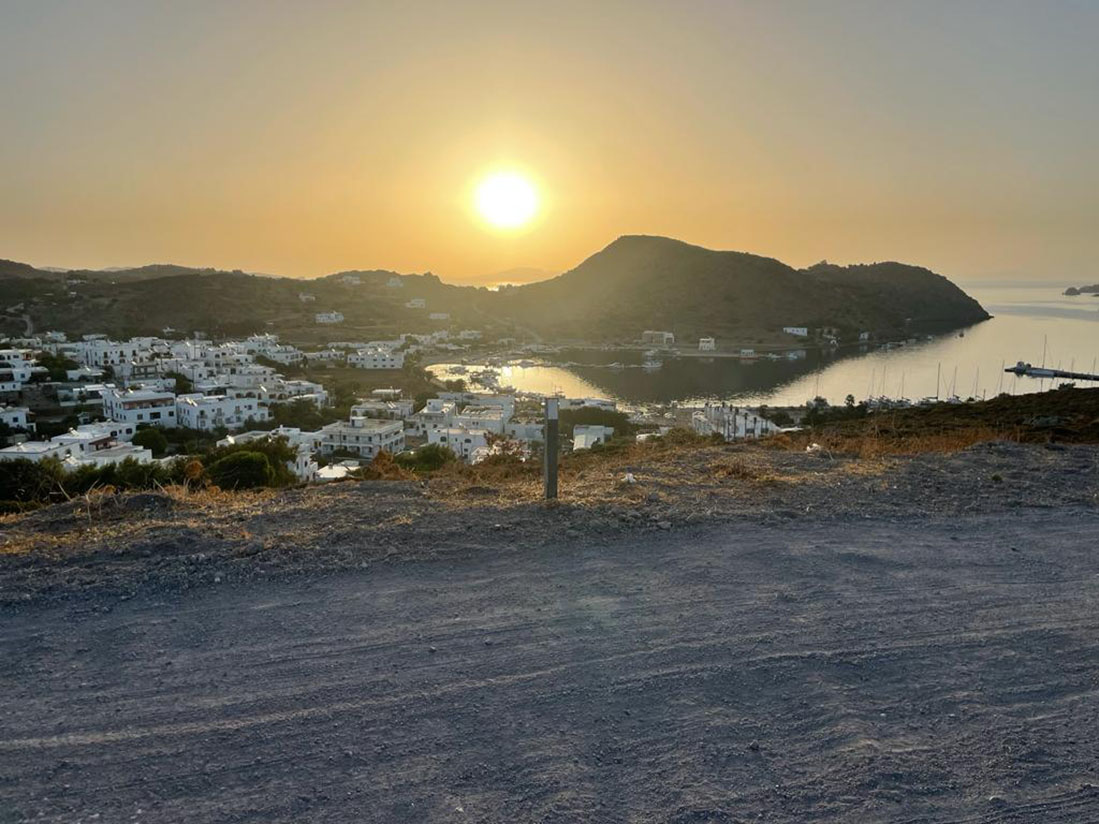
Tears came to his eyes. He’d named the trehandiri for his daughter. When she was little, they used to go down to the harbor hand-in-hand to sound out the names of the boats. That’s how she learned to read. The thing was that her reading had no end: panhellenic exams, university, master’s. At age 25, she was appointed to a teaching position in Athens by examination. Eleftheria Nazou, number 36 among over 12,000 candidates. That’s how Eleftheria left Patmos for good. Anestis was inconsolable until he bought Orea Eleftheria the trehandiri, which helped fill in the void left by Eleftheria the daughter.
He submitted the listing to the Patmos Chronicles. He bought a For Sale sign, but his back began hurting unbearably while he was walking to the dock, and he was obliged to take a taxi home. Medicine, doctors, hot pads, ice packs, bed rest, at-home physical therapy. . . he even tried the corset that his wife bought from the pharmacy. For days he couldn’t leave the house. On Great Tuesday of Holy Week, he resigned to fate. While it was still dark, he opened the balcony door. Α gust of sea air rushed in. Something about it felt holy, as if it had come from centuries back. It blew inside the first summer flower: a tiny fuschia bougainvillea.
Anestis got dressed without waking his wife, descended the old whitewashed steps of Kasteli, and walked to the dock with Zoe on her leash lest a car hit her. Anestis’s grandfather’s trehandiri had sails. His had a 125hp motor, but they were roughly the same thing, built by an artisan boat carpenter and painted with love in turquoise, red, and mustard. Anestis pulled the mooring line. With his left foot well planted on earth, he stepped onto the boat with the right and let Zoe jump over the gap. Then he followed her aboard. The sea was dark with tracts of orange and red. Anestis ran his fingers beneath the railing. They didn’t touch oakum; beautiful Eleftheria was well painted. He left his jacket along with the For Sale sign on the cabin berth. From a locker he took out soft rags, with which he applied the polish to all the chrome elements. While he was waiting for it to dry, he made a heavy, sweet Greek coffee at the kitchenette and sat with Zoe on his lap to watch the sea, blue-grey like the sugar packages brought by the Italians. All morning, Zoe sunbathed while Anestis rubbed away the dried polish. The sea gradually became bright, almost white. It was such a beautiful day that Anestis didn’t want to go home. Instead, he took out oil and clean rags and began treating the cabin woodwork. After noon, when he was getting close to finishing the job, the sea turned the blue that everybody adored. Anestis couldn’t figure out why all the songs and poems talked about that blue. If you had the patience to watch the Aegean in all its hours and all its seasons, it revealed itself through an entire spectrum of colors.
As soon as Anestis closed the oil cap, the divine fish hook pierced his spine beneath the belt. “Enough,” he said. He put the oil away, gathered up the soiled rags, and put them into a plastic bag to take home. He taped the For Sale sign to the windshield, sat at the helm, and wept as he had never done for the daughter who left for Athens.
Not one local Patiniotis expressed interest in the trehandiri. Many said that Anestis was asking too much money, but he refused to lower the price. He knew that Orea Eleftheria was worth it. In June, some European vacationers arrived. More than the previous summer, when plenty remained at home either out of fear or because of the restrictions. But still nobody expressed interest. Of course. How could a foreigner think of buying a boat that he might not see for years if they closed the borders again?
June came and went. August too. Then the whole year. The world became so ugly that sometimes Anestis didn’t even want to go to the kafenio to see his fisherman friends. Who wanted to drink coffee and hear Did you do it? How many? We have to know in order to take our precautions. Spring came again, followed by a summer without any restrictions. Apart from the fines levied on the noncompliant retirees, you’d almost say that freedom had prevailed. Even the questions stopped because people feared the arguments and even fistfights that their indiscretion might provoke.
Around the middle of August, Anestis climbed down from Kasteli with Zoe at five o’clock in the morning. At that time the only sounds were the waves, the crowing of roosters, and the wind that made the bougainvilleas snap against stone walls like phantoms. They passed Scala, redolent with jasmine and fabric softener. They walked along the road south to the dock and boarded the trehandiri. Anestis washed the boat with soap to expel the summer dust and make it shine. At about eight, while both scooters and church bells were disturbing his precious quiet, his cell phone also rang. On its broken screen, held together by clear tape so that it wouldn’t fall to pieces, appeared an unknown number. Anestis hesitated. Who could be calling at this hour? Perhaps something had happened to one of the kids?
He picked up. A polite foreigner—English or German, he suspected—requested in Greek to see the trehandiri. They agreed to meet that evening outside the post office, a stone building remaining from the Italian Occupation. Everybody met there because the building’s imposing stone tower was the most characteristic architectural element of Scala. At half-past six in the afternoon, Anestis settled onto a bench beneath the post office arcade. His hands were sweating more than they had when he sat his ninth-grade exams at age 23 in Athens. As a child he hadn’t managed to finish the gymnasion. He succeeded, however, as an adult, going to school with children by day and working in construction by evening.
Now he looked through the arcade toward the street. The foreigner had a house in Chora. He’d probably arrive by car. Perhaps on a scooter, but usually northerners didn’t like scooters. At ten past seven, Anestis heard a voice close to him, on the side of the square: “Mister Anestis? Forgive me for being a bit late, I came on foot.”
Anestis slowly rose to his feet so that his back wouldn’t bite him, murmuring, “Nobody comes down by foot anymore.”
“I’m English.”
Anestis didn’t understand what relationship the man’s ethnicity had to walking. He stood up straight and took a better look. The foreigner was a middle-aged man with a large, sunburnt bald spot. He wore heavy square glasses like those of Anestis, a simple navy t-shirt, white shorts, and brown leather shoes with rubber soles. A surgical mask, hanging from his wrist like a bracelet, completed an outfit better suited to politically correct yachting rather than fishing. Anestis sighed: the foreigner might have strong legs, but he also had no idea.
“I’m Sandy Corbin. I called about Beautiful Freedom.” The man didn’t give his hand. Not many people did that anymore either because they were afraid of the microbe or because they were afraid that the other person was afraid. Anestis was afraid neither of illnesses nor of people. Even after the microbe took his former boss in Athens, Anestis refused fear. When your time came, he always said, you say goodbye and return peacefully to God and to your dead. If you believe, that is.
Anestis offered his hand, gave Sandy’s a hearty shake, and said, “Anestis Nazos. It’s a pleasure to meet you, son.”
Sandy’s eyes—grey like the Aegean shortly after dawn—came to life. “I’m sorry I didn’t give my hand right away, Mister Anestis. I never know when to shake hands and when not to, when to wear a mask or not . . .”
“How can you, son? The world has lost its mind.”
They set out, passing the navy ship that had been sitting for days in the harbor, perhaps to remind the Patiniotes that there was danger of invasion. Anestis didn’t believe the things that were said on television about war, and so he didn’t worry. They proceeded on the coastal road, talking along the way. Sandy was a professor of Modern Greek Literature in London, divorced and childless. His grandfather had served in Patmos during the military protectorate after the war. Sandy told Anestis how he had grown up with stories of an island so bright that it resembled the next world. On that island, his grandfather had said, there were also caves where God spoke, and the seas were so full that the fish jumped into nets. Even better, the island’s women made an exquisite elixir from orange flowers and baked delicious cheese pies in the tins left over from Swan ham. “This detail always ruined the fairytale for me,” said Sandy, looking upward and toward the right, as if he also was receiving his words from a divine source. “Until I visited as a student and tried a Patiniote pita. Then I understood that a pie baked in a cast-off ham tin is more magical than fish jumping into nets.”
“The fishing is good here,” said Anestis with a slight laugh, “but not that good. Times have changed.”
“That’s why I come only in the summers. The rest of the year I teach in London. The coming and going helps me keep my grandfather’s fairytale alive.”
They arrived at the dock. Anestis reached for Eleftheria’s rope, but he felt a skewering in his back. A moan of pain escaped him.
“Allow me.” Sandy pulled the trehandiri to the dock, boarded, and, still holding the rope in one hand, gave the other to Anestis.
Once aboard, Anestis asked, “Did your grandfather ever make it back to the island?”
Sandy looked up at the sky and squinted. It must have been a tick, this looking-up thing. “No,” he said. Grandpa always talked about buying a sailboat and setting out for Patmos, but before he even retired, he was diagnosed with Alzheimer’s. He passed his last years drawing sailboats in a nursing home. My father also dreamed of travelling to all the Mediterranean islands.” Sandy lowered his gaze to the sea. “But the pandemic took him quite suddenly. That’s why I want to buy a boat now. My family has had its share of unrealized dreams.”
Anestis put his hand on Sandy’s shoulder, wished good paradise, and added, “There’s nothing more difficult than losing a father. Courage, son.”
He showed Sandy the trehandiri, her wood, her equipment, her engine, the cabin, the electronics, the toilet, everything. Then Anestis gave Sandy a chance to look at anything he wanted for a second or third time on his own. Sandy did a round of the boat. At one point he grabbed the railing, paused his photo taking, and felt more carefully beneath. “Mister Anestis, did you paint under here?”
“How did you know?”
“I saw another trehandiri yesterday. It was all oakum beneath the railing, a most disagreeable texture.”
“You’re the first person who ever noticed, son.” Anestis showed the homemade device that allowed him to see under the railing: a mirror to which he had fixed a handle that bent like an elbow.
“Ingenious,” said Sandy, who perhaps wasn’t so clueless after all. After finishing his round of the boat, Sandy said, “If you’ll sell me Beautiful Freedom, Mister Anestis, I want her.”
Anestis felt a tightening in his chest. He didn’t really want to give his Eleftheria to anybody. Then he thought that a person who appreciated the painting beneath the railing would appreciate the entire boat. He would respect her. And in any case, Anestis had to sell the trehandiri to someone. He reluctantly accepted.
On Monday, they began the process. Anestis told his wife about it while they were eating dinner in their courtyard: “It’s as if you want to sell a cup of coffee and they demand the sales receipt for the cup, the composition of the porcelain, certification of the quality of the water, an import permit for the coffee, the insurance card of the employee who made it, the stovetop guarantee, inspection of the gas line, a signed declaration that you put a piece of rose loukoumi on the saucer as an accompaniment . . .”
His wife was so annoyed that she couldn’t stop mumbling “Holy Mother, help us” while she was clearing the table. Anestis never said Holy Mother, help us because he didn’t believe in the Holy Mother. Instead, he cursed in the island dialect: batúdi! Wankers!
In the following days, Anestis and Sandy signed the sales agreement. Sandy submitted the buyer’s application. They gave photos, declarations, certifications, permits, but in the middle of the process, Sandy disappeared without notice or goodbye. He’d probably gotten fed up. That was the point of bureaucracy, anyway. Since the state couldn’t cut the fishermen’s hands, they cut fingers one by one until you cried mercy and handed over the boat for demolition.
September passed. Sandy didn’t return. Don’t ever trust anybody, Anestis’s grandfather used to say. Was grandfather ever wrong? In October, Anestis resumed his dawn descents to the kafenio. He always paid for his coffee as soon as he arrived so that no one would treat him, and he’d sit beside the door with Zoe on his lap and wait for the other fishermen to arrive. The microbe was now a taboo subject, as if it had never existed. The fishermen talked instead about tangled longlines, about the bonitos that had given them trouble the previous night, about Yanis or Manolis or Mathios, whom the harbor authority had caught with 10.1 kilos of fish and obliged to throw a chub mackerel back into the sea and pay a fine on top.
“Is the sea a supermarket where you can say give me half a kilo of mullet and a quarter of mackerel?” said Pothitos, a retired electrician who always fished with a harbor cat as company. He said that the ferile cat brought him luck.
Anestis gazed at the sea, swept his hand over the white mustachios that descended in a straight line all the way to his chin, and said, “Nothing separates me from the working-class Turk, despite what the television says. My problem is the Athenian politicians, may their heads be covered in asphalt!”
Some agreed. Others, who were still wearing rubber fishing boots, left to take their bonito catch home for salting. Even if the amateur fishermen had the right to sell, no taverna or fishmonger would take bonito because it was too cheap for them to earn anything. Anestis stayed in the café a while longer, greeting every passerby by name. At eight o’clock, when the waitress came out to clear tables, he rose, pulled up his trousers, and said, “That’s it, daughter. That’s it.” As if they’d been speaking together all that time.
He put Zoe on her leash and set out for the coastal road. Walking was pleasant at that time of morning. He enjoyed listening to the silvery ringing of goat bells while watching the trehandiri boats searching for bluefish near the harbor. Bluefish loved harbors. They were tough fish that pulled on the hook. Like me, thought Anestis.
The north wind blew strongly while he plodded toward Saint Andreas. It didn’t matter that his back was acting up because, even if he didn’t have back problems and could go out fishing, he wouldn’t catch anything. It had been many days now that they’d had north winds. The fish would bite on the first windy day, maybe the second, but when the north wind continued, they stopped biting. That’s how Anestis consoled himself that he wouldn’t go fishing, that he wouldn’t catch any of the adventurous bonitos that travelled down to Rhodes at that season, made a circle, and returned to the Black Sea.
His cell phone rang. He answered without looking at the broken screen.
“Good morning, Mister Anestis,” said the caller with an English accent. “Forgive me for calling at an inappropriate time. It’s Sandy.”
“There’s no inappropriate time for a fisherman,” said Anestis.
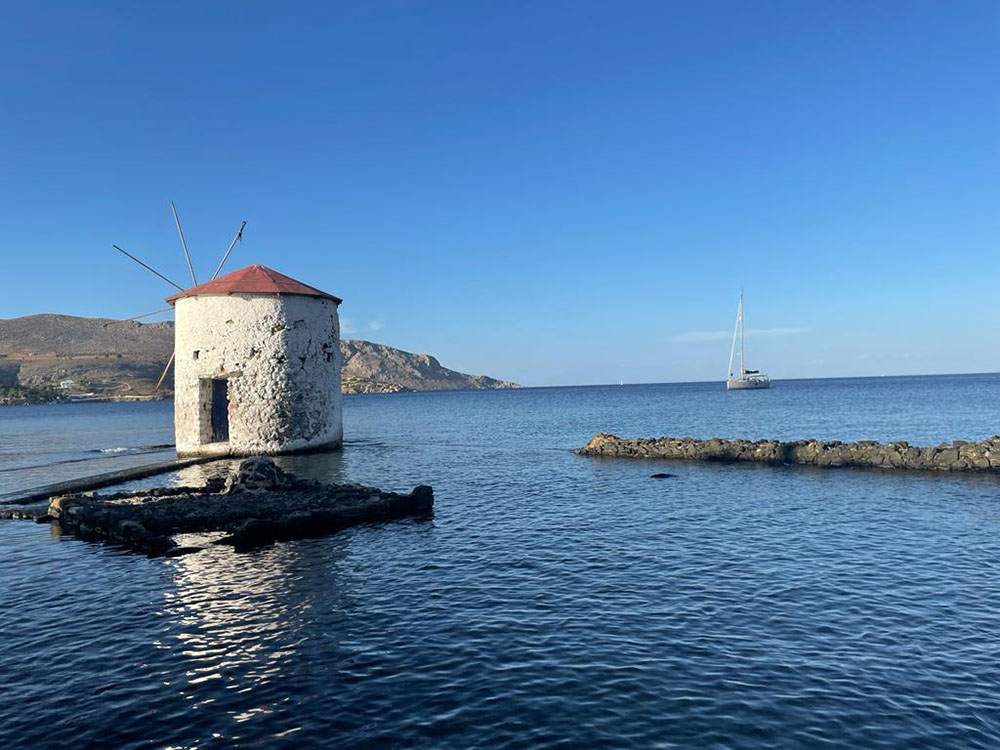
Sandy apologized for his sudden departure. He had issues at the university, where he was teaching a new course on the Greek novel of the twentieth century, and a colleague had died of heart failure . . . he hadn’t had any time to think or call. Now he had returned to the island and he wanted to see the trehandiri again in company with his friend, a Greek admiral, if the boat was still available, that is. They could meet right away.
Anestis sighed like the north wind. If Sandy needed a friend’s opinion, it meant that he had doubts. In other words, he didn’t leave suddenly only because duty called. Anestis thought about saying no, just as he had turned down many jobs in his lifetime, even at the monasteries, because they would be performed on the sly, without permits from the Architectural Council. He was curious, however, to meet the admiral, and he’d felt a fatherly affection for Sandy, despite his strangeness. Anestis accepted.
An hour later, Sandy and his friend arrived at the dock. The admiral wore a white, short-sleeved uniform with gold epaulettes, no hat. The reason that he was in Patmos wasn’t clear. Perhaps it had something to do with the warship in the harbor, but Anestis didn’t ask for fear of appearing nosy and provincial. Zoe rushed to greet Sandy as soon as he boarded the trehandiri. Sandy sat down on the back deck, Indian-style, to give her a through petting. He’d lost all his color in England. His bald spot was now so white that he resembled a full moon over the Aegean. Perhaps Zoe saw it too, because she licked Sandy’s head furiously, as if she wanted to cure him of the North.
The admiral knocked on all the boat’s wood, examined the engine, and took what seemed like three hundred photos until Anestis said, “Admiral, check out the underside of the railing.”
The admiral’s face compressed like a fender caught between boat and dock. His tenseness had to have something to do with his rank because all the admirals on television had that same expression. He felt beneath the railing but said nothing.
“Do you feel oakum?” asked Anestis.
“No. It’s smooth.”
Anestis took out the mirror with the bent handle and displayed it with pride. He thought that the admiral almost smiled, but he couldn’t be sure. Anestis said, “Now do you think that a person who paints beneath the railing could be sloppy or stingy anywhere else?”
“Probably not,” said the admiral.
Anestis turned to Sandy. “You’ve got your friend’s approval, son. Now the question is whether you have the stomach for our bureaucracy.”
“I’ll make a few calls,” said the admiral. “Wherever things ran aground, I’ll get them sailing again.”
That was it. If you have connections in Greece, nothing stops you. They submitted the last papers and Anestis paid his monthly fine, but something was preventing him from making the final step. He wasn’t sleeping at night. He’d get dressed and walk along the harbor with Zoe until the kafenio opened. How would Sandy take care of Eleftheria while in London? Would he leave her abandoned like a mistress? To rot in the sea or dry out on land? Fortunately, Sandy called and asked to meet for an evening ouzo, eight o’clock, in order to discuss a few things. Perhaps he was having doubts again. Che sarà sarà, Anestis whispered to himself, just like his father used to do. If Sandy wasn’t the right man, it was better for the deal to fall through.
When they sat down at the taverna, the sea had already disappeared into the night’s blackness. Only the reflections of the kitchen lights on the water showed where the dry pebbles stopped and where the waves began. Anestis chattered about the cold winter on Patmos, about the sun that warmed Kasteli during frosts, about the oregano that he used to collect up there, near the island acropolis, when he was a child. Seeing that Sandy was interested in such stories, Anestis continued. He talked about the earthquake of 1956 and the subsequent tsunami that had destroyed his grandfather’s trehandiri and flooded Scala. “Ten centimeters more and the sea would have cut the island in half,” said Anestis. Thus their conversation flowed, for Anestis didn’t want to say anything serious before the ouzo filled them with good spirits and levity, nor before they ate the boiled chicory, courgette flowers stuffed with feta, peppers filled with raisins and pine nuts, and roasted aubergines with chickpeas. When they had finished all that, as well as the fried calamari that they ordered after they’d had too much ouzo, Anestis felt sleepy. He decided it would be better for them to sober up with coffee before talking seriously.
Along with the coffees, the waiter brought poungia stuffed with nuts and sprinkled with powdered sugar. Both Sandy and Anestis ate the treats slowly, delaying. Finally, after the last bite of biscuit flavored with nutmeg and orange flower, Anestis said, “You first.”
Sandy gazed upward, toward Ursa Minor, and said, “I’d like you to keep a key, Mister Anestis. You can take Eleftheria out whenever you’d like. If you accept, I’d also like to pay you to look after her.”
“Payment is out of the question, son.”
“That’s kind of you, but it’s a lot of work, something we can talk about later of course, and anyway . . . there’s something else.” With his eyes still fixed upward, either on the stars or on the invisible, Sandy asked, “Will you come fishing with me? I know I’ve got a lot to learn from you.”
Anestis looked out over the sea, into which the Wednesday cruise ship had just set sail. Its blue lights, like phosphorescence, shined in straight horizontal lines from the hull. Its horn sounded into the night. Anestis replied, “Whenever you’d like, son.”
A smile finally illumined Sandy’s face. “Thank you, Mister Anestis. And if I’m not mistaken, there’s something that you would like to ask me.”
Anestis took a deep breath of sea air and said, “What are you going to rename her, son?”
“I’m not. She’s already been baptized.” Sandy closed his eyes bashfully and added, “But now I’ve got to find a beautiful Eleftheria.”
“I have a daughter named . . .” Anestis said without thinking.
“Does she spend the summers in Patmos?” asked Sandy.
Anestis wasn’t sure if Sandy was joking or not. He felt the old tightening in his chest, his habitual reluctance. The idea of Sandy as a son-in-law wasn’t disagreeable, but his daughter . . . Anestis didn’t know Sandy well enough for that. In any case, a daughter had to choose for herself, and since she hadn’t chosen all these years, she wasn’t likely to do so now.
“She visits in the summer,” said Anestis. “But she doesn’t stay long.”
“Deal off then,” said Sandy, dimpling. “Now that I have the trehandiri, I plan to spend as much time here as I can.”
Anestis didn’t reply. He wanted to see how Sandy would look after Orea Eleftheria. You only understand how much a person really loves something after he acquires it; never before. If Sandy cared for Eleftheria the trehandiri properly, then perhaps, next summer, they might all meet for an ouzo on that same beach. Anything that might keep Eleftheria the daughter in Patmos for more than a week was worth a try.
Translated from the original Greek by the author and dedicated to her father, who now sails freely on celestial seas.






